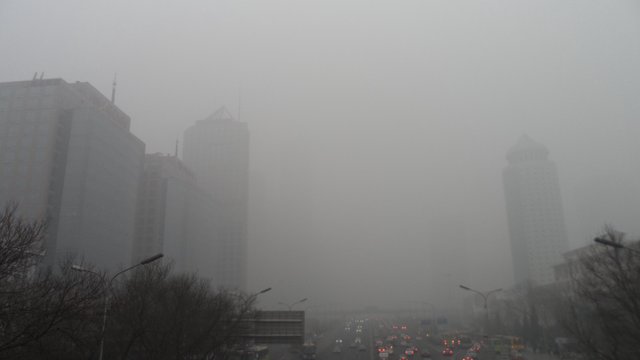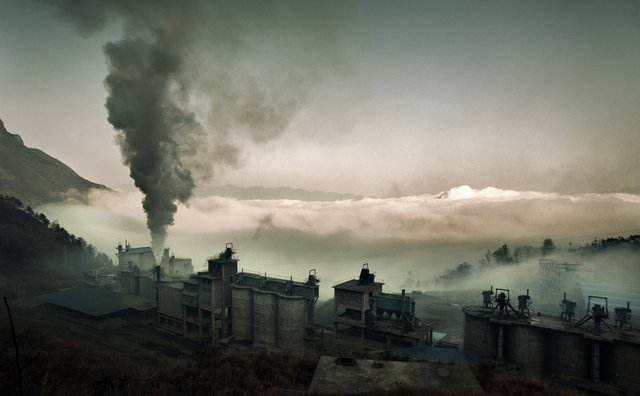Without recourse, lacking enforcement, a Beijing activist got desperate
Pres. Donald Trump has attacked the U.S. judicial system after it blocked his Muslim ban. At the same time, Trump’s top advisor Steve Bannon has vowed to “desconstruct the regulatory state.” Scott Pruitt, Trump’s corrupt Environmental Protection Agency head, has begun doing just that with regard to America’s ecological protections — pledging to cut back rules preventing air and water pollution.
The president’s assault on the courts and the EPA could have a devastating effect on Americans’ health and safety and the fates of countless other species. There’s a great, smoggy example of what happens in the absence of a strong judiciary and environmental enforcement — China, one of the dirtiest countries in the world.

Two-thirds of the world’s high-end steel-producers — together burning 800 million tons of coal per year — are located in a geographic ring surrounding Beijing. In all, China consumes half the world’s coal in what are, by world standards, highly inefficient plants. As a result, the air in Beijing typically registers around 100 micrograms of particulate per cubic meter, six times what the EPA considers safe. And Beijing isn’t even China’s dirtiest city.
China has no independent judicial branch and also possesses a tiny, weak environmental agency — the Ministry of Environmental Protection employs just 400 people in a country of 1.4 billion . The EPA, by contrast, employs nearly 15,000 people in a country of 300 million, and U.S. courts frequently intervene to block polluters. Unlike Americans, everyday Chinese people suffering from polluted air and water have few legal ways of fighting for cleaner air and water.
“Rules and regulations are there, enforcement is not,” Ma Jun, director of the Institute for Public and Environmental Affairs in Beijing, told DEFIANT during a visit to his Beijing office. What’s more, “in China, environmental litigation is quite difficult,” Ma added. The Chinese People’s Institute of Foreign Affairs, a Hong Kong-based non-profit organization, sponsored the visit.
Starting in 2007, Ma got desperate, and began trying public shaming as a way of pressuring polluters. Ma’s organization runs a website — a “public tribunal,” he called it — that aggregates data from thousands of government air- and water-quality sensors, producing a constantly-updated picture of exactly where the pollution is coming from. The site recorded 76,000 pollution violations in 2016, Ma said.
The idea is that the data will motivate people to complain, and the complaints will somehow convince companies to clean up on their own — or compel the government to force them to do so. Ma described his strategy as “intensive participation.” For sure, the public wants cleaner air. “Bottom up, there’s a lot of pressure.”

Ma said his work has leveraged that public outrage and forced thousands of foreign suppliers working in China to change their behavior. Chinese brands are coming around, too, he claimed. Ma said IPE and its supporters succeeded in persuading Gap, Uniqlo and Walmart to stop dumping 40,000 gallons a day of wastewater into a lake in Hongzhou. One area supplier spent $30 million upgrading its water-treatment facilities, he explained.
But for all of Ma’s work and IPE’s scattered successes — and despite the fact that air pollution is the Chinese public’s number-one concern — fundamentally China remains a polluter’s paradise. Government regulators lack the resources and will to hold industry accountable, even as more and more everyday Chinese desire change.
“We still haven’t seen the turning point,” Ma said of China’s environmental problems. And he kept coming back to two major, systemic reasons. Enforcement and the courts.
If the Trump administration succeeds in shrinking and curtailing the EPA — and if Trump’s attacks on the courts have the effect of diminishing judicial power — then the United States could, in time, become what China is today. Dirty. Unhealthy. And hostile to the desire of everyday people to hold polluters accountable.
Americans should have to resort to the same desperate tactics that Ma has done, just to ensure our air is breathable and our water is drinkable.
This article is sourced from articles across the web
Hi! I am a robot. I just upvoted you! I found similar content that readers might be interested in:
https://medium.com/defiant/gut-the-epa-and-courts-and-well-wind-up-like-china-197ded87db0d
Downvoting a post can decrease pending rewards and make it less visible. Common reasons:
Submit